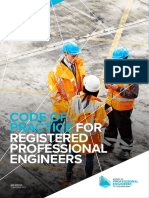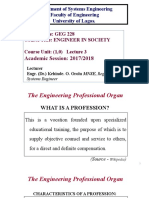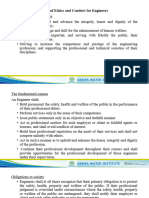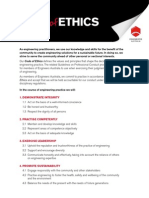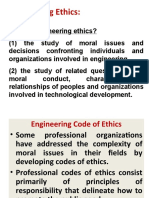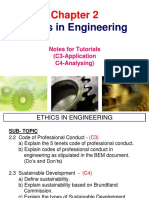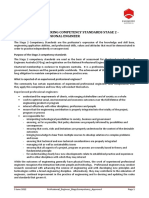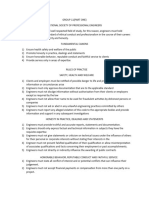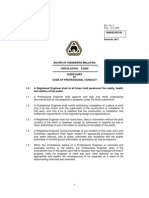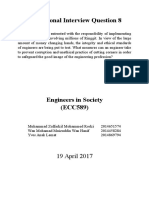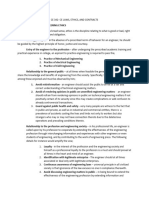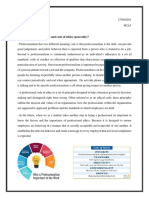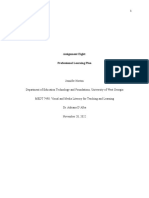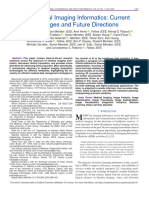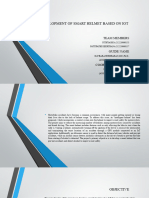Code of Practice for Registered Professional Engineers in Queensland/ September 2003/p1
CODE OF PRACTICE
FOR REGI STERED PROFESSIONAL ENGI NEERS I N QUEENSLAND
Preamble:
Engineering is a creative process of synthesising and implementing the knowledge and
experience of humanity to enhance the welfare, health, and safety of all members of the
community, with due regard to the environment in which they live and the sustainability of
the resources employed. Engineering professionals must display detailed technical and
professional understanding and the wise application of that understanding.
Objectives:
The objectives of this Code are to:
1) fulfil the requirements of Clause 108 (1) of the Professional Engineers Act, 2002,
which states that the Board of Professional Engineers of Queensland must make a
code of practice to provide guidance to registered professional engineers as to
appropriate professional conduct or practice;
2) set out the minimum levels of professional conduct required to be met by registered
professional engineers in Queensland; so that they can carry out all their roles within a
framework of integrity, care for the public, and competency; and to
3) assist the Commercial and Consumer Tribunal in determining whether the registered
professional engineer has behaved in a way that constitutes unsatisfactory professional
conduct, or practice (Professional Engineers Act, 2002, s129)
Principles:
The following principles reflect the obligations under the Professional Engineers Act, 2002
that a registered professional engineer in the practice of engineering in Queensland has to (1)
society; (2) clients or employers; and (3) general professional obligations.
Code of Practice for Registered Professional Engineers in Queensland/ September 2003/p2
(1) Obligations to Society
1.1. Be informed of social, environmental, economic and other possible consequences
A registered professional engineer must take reasonable steps to be informed, and to inform
clients and employers, of the social, environmental, economic, and other possible
consequences that might arise from engineering activities.
1.2. Act with honesty, integrity, fairness, and without discrimination
A registered professional engineer must act with honesty, integrity, fairness, and without
discrimination.
1.3. Take reasonable steps to safeguard health, welfare, and community safety
A registered professional engineer must take reasonable steps to safeguard the health, welfare,
and the safety of the community.
1.4. Have regard to, and reduce effects on, the natural environment
A registered professional engineer must:
(a) have regard to reasonably foreseeable effects of engineering activities on the natural
environment; and
(b) take reasonable steps to reduce reasonably foreseeable adverse effects on the natural
environment.
(2) Obligations to Clients or Employers
2.1. Act truthfully, objectively, and not mislead people, nor engage in
misrepresentation
A registered professional engineer must act truthfully and objectively, and not mislead people
in the provision of information, opinions, statements and evidence, nor misrepresent a
situation.
2.2. Inform client or employer of consequences of disregarded advice
A registered professional engineer must strive to make clients or employers aware of
professional concerns regarding particular actions or projects and of the consequences if
engineering advice, decisions, or judgments are overruled or disregarded.
Code of Practice for Registered Professional Engineers in Queensland/ September 2003/p3
2.3. Disclose actual and potential conflicts of interest
A registered professional engineer must disclose any actual or possible conflict of interest to a
client or employer upon discovery of that actual or possible conflict of interest. Conflicts of
interest will include any financial or other interest that is likely to affect the engineers
judgment on any engineering activities carried out for that client or employer.
Examples of possible conflict of interest situations include
Not informing a client or employer of any business association, interests, or circumstances that could be
construed to influence judgment, or the quality of services, or that might raise a reasonable apprehension
of such influence.
Accepting compensation, financial or otherwise, from more than one party, for services on the same
project, or services pertaining to the same project, without disclosing the compensation arrangements to
affected parties.
Soliciting or accepting substantial financial or other valuable considerations from material or equipment
suppliers for specifying their products.
2.4. Not disclose or misuse confidential information
(a) A registered professional engineer must not disclose confidential information of an
employer or client without the agreement of that client or employer.
(b) Subclause (a) does not apply if:
(i) the failure to disclose information would place the health or safety of people at
significant and/or immediate risk; or
(ii) the engineer is required by law to disclose that information.
(c) A registered professional engineer who obtains another person's confidential
information in connection with one purpose in the course of professional engineering
activities must not use that information for another purpose.
(3) General Professional Obligations
3.1. Bring knowledge, skill, judgement, and care to the task
A registered professional engineer must bring to the engineering task knowledge, skill,
judgement, and care that are of a standard which might reasonably be expected by the public
or the engineers professional peers.
Code of Practice for Registered Professional Engineers in Queensland/ September 2003/p4
3.2. Not engage in professional misconduct, or fraudulent or dishonest behaviour
A registered professional engineer must not:
(a) engage in misconduct in a professional respect; and/or
(b) in fraudulent or dishonest behaviour in the practice of engineering.
3.3. Communicate with fairness, honesty, and adequate knowledge
A registered professional engineer must, both orally and in writing, express opinions, make
statements, or give evidence with fairness, honesty, and only on the basis of adequate
knowledge.
3.4. Not promise, accept, or give inducements
A registered professional engineer must not:
(a) promise or give to any person anything of substantial value intended to improperly
influence that person's decisions as they relate to the engineer's activities or to secure
work; or
(b) accept from any person anything of substantial value intended to improperly influence
the engineers decisions.
3.5. Work within area of competence and not misrepresent competence
A registered professional engineer must:
(a) undertake engineering activities only within their area of competence;
(b) not misrepresent their competence;
(c) not knowingly permit engineers whose work they are responsible for to breach
paragraph (a) or paragraph (b).
Examples of competence in an area of practice include
formal training in that area;
any previous experience or exposure in the type of work that has been supervised by a registered
professional engineer;
recourse to an expert to supervise the task.
Examples of not misrepresenting competence in an area of practice include
fully informing the client as to any limitations or legitimate concerns that an engineer might have with
regard to their competence in relation to the clients specific project; and/or
organising for an expert in the area to provide supervision of the engineer in relation to the task.
Code of Practice for Registered Professional Engineers in Queensland/ September 2003/p5
3.6. Continue to develop knowledge, skills, and expertise
A registered professional engineer must:
(a) continue to develop relevant knowledge, skills, and expertise throughout their careers;
(b) actively assist and encourage those with whom they are associated to do likewise.
3.7. Comply with the Code and support those who seek to uphold the Code
A registered professional engineer must:
(a) not assist in or induce failure to comply with this Code of Practice;
(b) support those who seek to uphold the Code if called upon, or in a position, to do so.
*****
ABRI DGED CODE OF PRACTICE
FOR REGI STERED PROFESSIONAL ENGI NEERS I N QUEENSLAND
This is an abridged version of the official Code of Practice for Registered Professional Engineers in Queensland
and should only be used as a guide. The principles below are expanded in the official version of the Code,
which forms part of the Professional Engineers Act, 2002.
Preamble:
Engineering is a creative process of synthesising and implementing the knowledge and
experience of humanity to enhance the welfare, health, and safety of all members of the
community, with due regard to the environment in which they live and the sustainability of
the resources employed. Engineering professionals must display detailed technical and
professional understanding and the wise application of that understanding.
Objectives:
The objectives of this Code are to:
(1) fulfil the requirements of Clause 108 (1) of the Professional Engineers Act, 2002, which
states that the Board of Professional Engineers of Queensland must make a code of
practice to provide guidance to registered professional engineers as to appropriate
professional conduct or practice;
(2) set out the minimum levels of professional conduct required to be met by registered
professional engineers in Queensland; so that they can carry out all their roles within a
framework of integrity, care for the public, and competency; and to
(3) assist the Commercial and Consumer Tribunal in determining whether the registered
professional engineer has behaved in a way that constitutes unsatisfactory professional
conduct, or practice (Professional Engineers Act, 2002, s129)
Principles:
The following principles reflect the obligations under the Professional Engineers Act, 2002
that a registered professional engineer in the practice of engineering in Queensland has to (1)
society; (2) clients or employers; and (3) general professional obligations.
(1) Obligations to Society
1.1. Be informed of social, environmental, economic and other possible consequences.
1.2. Act with honesty, integrity, fairness, and without discrimination.
1.3. Take reasonable steps to safeguard health, welfare, and community safety.
1.4. Have regard to, and reduce effects on, the natural environment.
(2) Obligations to Clients or Employers
2.1. Act truthfully, objectively, and not mislead people, nor engage in misrepresentation.
2.2. Inform client or employer of consequences of disregarded advice.
2.3. Disclose actual and potential conflicts of interest.
2.4. Not disclose or misuse confidential information.
(3) General Professional Obligations
3.1. Bring knowledge, skill, judgement, and care to the task.
3.2. Not engage in professional misconduct, or fraudulent or dishonest behaviour.
3.3. Communicate with fairness, honesty, and adequate knowledge.
3.4. Not promise, accept, or give inducements.
3.5. Work within area of competence and not misrepresent competence.
3.6. Continue to develop knowledge, skills, and expertise.
3.7. Comply with the Code and support those who seek to uphold the Code.
